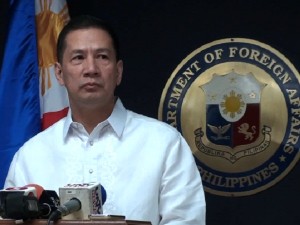PH gov’t to skirt Sabah conflict in Asean summit — DFA
MANILA, Philippines — The government will skirt the Sabah conflict — a pestering issue between the Philippines and Malaysia — in next week’s Association of Southeast Asian Nations’ summit in Brunei, according to officials.
But with the backing of leaders of Brunei and other Southeast Asian countries, President Aquino would push for an early conclusion of talks for the adoption of code of conduct in the South China Sea, the officials said on Wednesday.
Foreign Affairs Assistant Secretary Raul Hernandez said the government was not planning to raise the Sabah crisis, triggered by the Feb. 9 incursion of followers of the Sulu sultan into Sabah, in the summit on April 24 and 25 in Bandar Seri Begawan.
“We’re not raising it. This is considered a bilateral issue,’’ the Department of Foreign Affairs spokesperson said in a Malacañang briefing.
But then again, Hernandez said the President had no bilateral meeting with Malaysian Prime Minister Najib Razak and other leaders because of the summit’s hectic schedule.
The Philippines, Malaysia, Brunei and Vietnam, together with Taiwan, were engaged in dispute with China over South China Sea.
“I think it’s more because of the short period of this summit. People are busy and this is actually a very short summit and not like the one that we had last November,’’ Hernandez said.
The Sabah issue was not tackled during the two-day state visit of Sultan of Brunei Haji Hassanal Bolkiah, who paid a courtesy call on Mr. Aquino at Malacañang last Tuesday, he said.
The Sultanate of Sulu obtained Sabah from the Sultanate of Brunei as a gift for helping put down a rebellion hundreds of years ago.
While Malaysia has reported decimating the followers of Jamalul Kiram III, who claims to be sultan of Sulu, Malaysia has yet to declare the crisis over.
Apart from reviving the Sultanate of Sulu’s claim to Sabah, the conflict has led to the deaths of more than 70 people, mostly Kiram’s followers, and sent thousands of undocumented Filipinos fleeing the state. Mr. Aquino has ordered a thorough review of the claim first raised by the Philippine government during the presidency of Diosdado Macapagal.
Meanwhile, Hernandez said Asean was “eager’’ in pushing for the early conclusion of negotiations on the adoption of the code of conduct to reduce the risk of conflict in the international waterway.
Given that Brunei was “very supportive’’ in discussing maritime security and cooperation in the South China Sea, the Philippines, with claims to parts of the area which it called West Philippine Sea, would be able to push for an early conclusion of the talks on the code of conduct.
Asean has agreed on the “draft elements’’ of the code of conduct, and has been hopeful China would agree to them, he said.
“It looks like Asean is very eager, and is also pushing for the crafting of the legally binding code of conduct as soon as possible,’’ he said. “We are ready with the elements [of the code] to be discussed with China. So we’re just waiting for China to positively respond to Asean as to the discussion and negotiation of the CoC.’’
“We are confident that there is a unanimous decision as to the decision to push the Code of Conduct in the summit and, also, later on with China when they agreed to discuss this issue,’’ he added.
The Philippines and other claimant-countries have been pushing for a system to resolve disputes in the South China Sea, but China has maintained that the time to discuss this issue is not t ripe yet, and prefers to negotiate with each country.
In the summit, the Philippines is expected to continue advocating maritime security and cooperation and push for the full and effective implementation of the Declaration of the Conduct of Parties in the South China Sea, and early conclusion of the code conduct.
The two-day summit opens on April 24 with a working dinner to be hosted by Bolkiah. This will be followed the next day by the Retreat Session, which will revolve around the agenda: Asean community 2015; the Asean’s central role and the regional architecture; Asean’s future direction; and exchange of views on regional and international issues.
The President will also join his counterparts in the 9th Brunei-Indonesia-Malaysia-Philippines East Asean Growth Area Summit after the retreat session.
The Philippines will also push for a review of the Asean Charter with a view of streamlining Asean work and meetings that number 1,600 a year.
“We just think this is too many. We also think that one summit every year would suffice. We’re trying to discuss this with other members,’’ Hernandez said.















